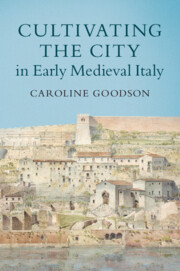Book contents
- Cultivating the City in Early Medieval Italy
- Cultivating the City in Early Medieval Italy
- Copyright page
- Dedication
- Contents
- Figures and Tables
- Acknowledgements
- Terms and Measurements
- Abbreviations
- Additional material
- 1 Urban Gardens and Gardeners
- 2 Patterns and Changes
- 3 The Shape of the Phenomenon
- 4 Alliances and Exchanges
- 5 Values and Ideals
- 6 Conspicuous Cultivation
- 7 Conclusions
- Bibliography
- Index
1 - Urban Gardens and Gardeners
Published online by Cambridge University Press: 08 March 2021
- Cultivating the City in Early Medieval Italy
- Cultivating the City in Early Medieval Italy
- Copyright page
- Dedication
- Contents
- Figures and Tables
- Acknowledgements
- Terms and Measurements
- Abbreviations
- Additional material
- 1 Urban Gardens and Gardeners
- 2 Patterns and Changes
- 3 The Shape of the Phenomenon
- 4 Alliances and Exchanges
- 5 Values and Ideals
- 6 Conspicuous Cultivation
- 7 Conclusions
- Bibliography
- Index
Summary
Reflection on food cultivation in modern cities opens up new lines of inquiry into the past, showing examples of civic authorities on the one hand, and community groups and individuals on the other, creating cultivated spaces for food production in periods of social and economic transformation. Examples from tenth-century Rome introduce the different kinds of evidence available for a study of the phenomenon, both material and textual. The material evidence of the cities of Italy (roads, houses, public buildings, and parks) provides the backdrop of urban change, the gaps in the urban fabric into which new gardens were placed. The available documentary evidence comprises charters of land sales, rents, and donations of urban properties, and there is discussion here of how those sources were produced and what they can tell us about the fabric of early medieval Italian cities as well as the people who lived in them. The chapter then sketches the historiographic landscape of the subject. Urban cultivation and gardening has long been recognised to have existed in early medieval Italy, but its relevance to broader pictures of social and economic history has not yet been evaluated.
- Type
- Chapter
- Information
- Cultivating the City in Early Medieval Italy , pp. 1 - 31Publisher: Cambridge University PressPrint publication year: 2021

